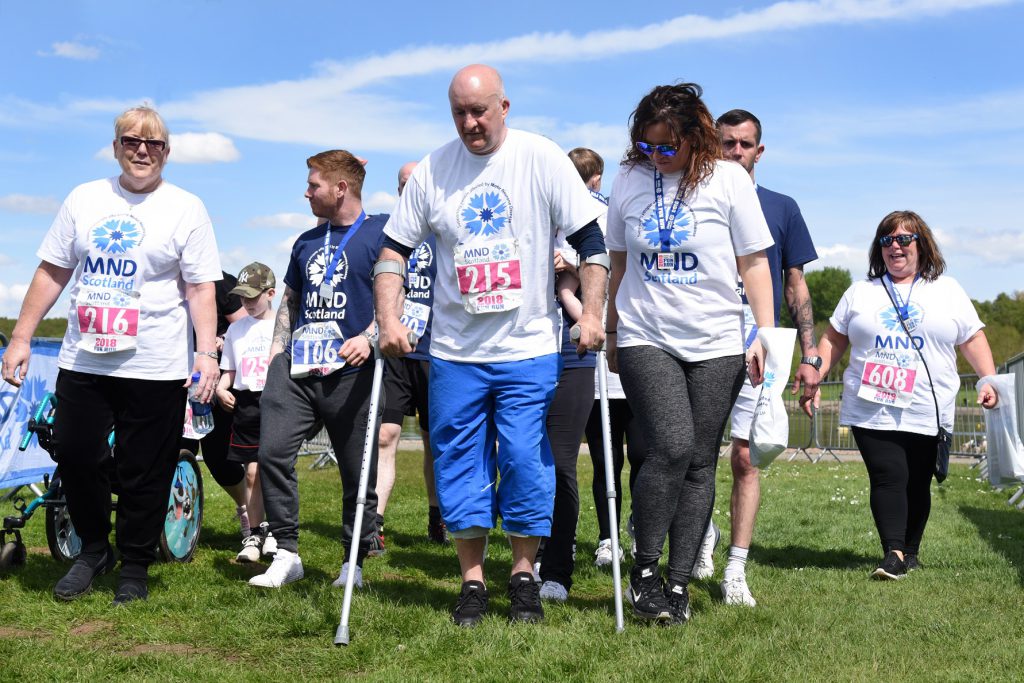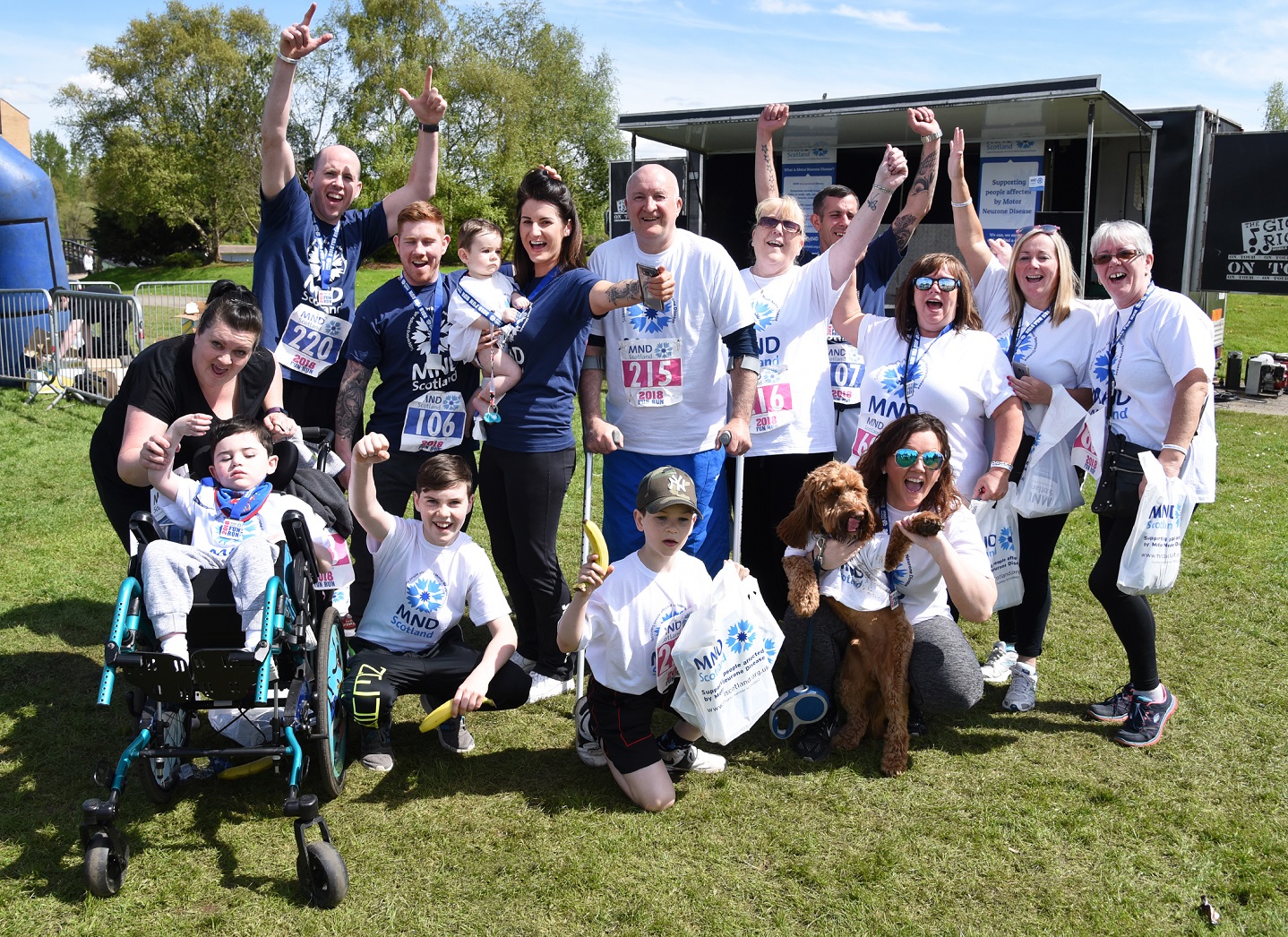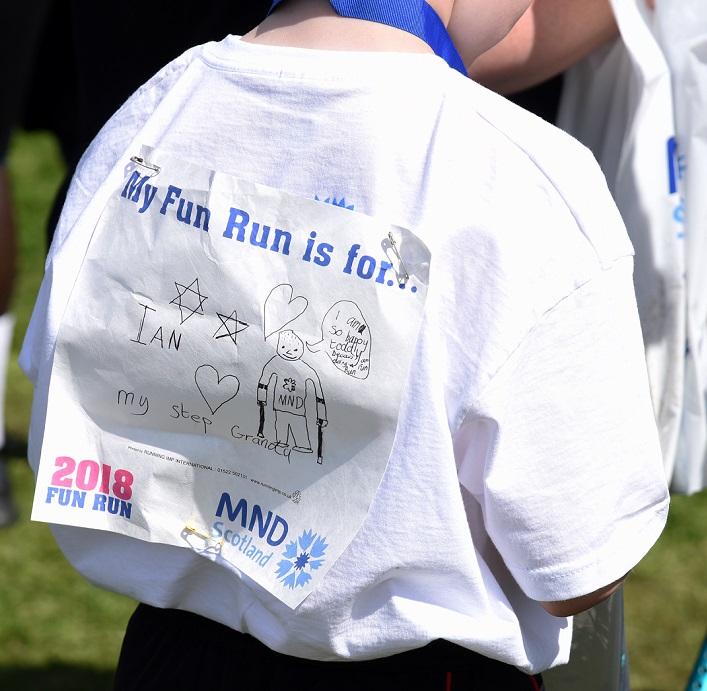What is MND
Find support
I have MND
I am supporting someone
Get involved
Research
About MND Scotland


As a former electrical engineer at Falkirk-based company Sulzer, Ian would travel as far and wide as Mexico, the US, Norway and offshore. In his spare time Ian would swing a golf club and soak up every extra minute with his family.
Ian met wife Ann (62) in 2010 and the couple married in 2014. Iain is the father of Derick (34) and Emma (30) and is the grandfather to Stuart (19) and Theo (9 months).
He is also a stepdad to Christopher (40), Andrew (37) and Theresa (33) and step grandfather to Kieran (12), Kara (12), Joshua (9) and Cameron (5).
But Ian and the family were left devastated in May 2016 when Iain was diagnosed with MND.
MND is a rapidly progressing terminal illness, which stops signals from the brain reaching the muscles. This may cause someone to lose the ability to walk, talk, eat, drink or breathe unaided.
Ian said: “I noticed the first symptoms in 2014 with a stiffness in my ankle. When I was younger I suffered a severe break in my ankle playing football, so I put it down to that.
“But I decided to visit the GP after that when I developed a cough that wouldn’t go away. I had also started to slur my speech when I was talking.
“The GP put it down to an infection in my vocal cords, but it never went away. After visiting my GP again, the assumption was that I might have a severe case of acid reflux and so I was booked into the hospital where they put a camera down my throat.”
While Ian was booked in for a series of tests, Ian’s symptoms began to increase.
Ann said: “We had been going back and forth for months and we weren’t getting any closer to an answer of what was wrong with Ian. We went for an MRI and a series of tests, but when they all came back clear we finally decided that enough was enough – we can’t go on like this. We were then referred to a consultant.
“During this time I started researching Ian’s symptoms on the internet, and I came across a website that described MND and it was exactly what he was experiencing. When we met with the doctor he asked us what we thought the diagnosis might be. When I said MND the doctor said he was inclined to agree with me.”
Ian said: “At this stage it was nearly 2 years since I had the first symptoms, so the consultant booked me in for a week of intensive tests.”
It was following this week of tests, in May 2016, that Ian’s diagnosis with MND was confirmed.
Ian said: “I was devastated when they told me it was MND but, in a strange way, it settled me down. Now at least I knew what I was up against.
“Everything goes through your mind. How am I going to do everyday tasks? Do I leave my work? Is this going to affect my marriage?
“I worry about how it affects Ann because, although I’m going through it, she has to watch me going through it.
“MND is a very, very cruel thing. If somebody had tried to explain what MND was to me a few years ago, I wouldn’t have believed them. I would never have believed it could be so cruel.
“When my walking started to be affected, my work decided to move me across to another part of the factory, doing testing, but I really didn’t like it and it was starting to bring me down.”
Following his diagnosis, Ian took the decision to retire so that he could take time to process the magnitude of his diagnosis and to spend time with his family.
“My doctor said that I should start thinking about retirement, because nobody knows how long I’ve got basically. Also, my daughter Emma had just given birth to a wee grandson and I wanted to spend as much time with them as possible.”
Following his diagnosis with MND, Ian has noticed that living with the illness has not been limited to his mobility.
Ian said: “It affects me socially. We still go out and we can still go on holiday but I’m not as excited about those things because I know that going out and going on holiday brings certain problems and it frustrates me a lot. When I see people doing something and I know I could do it better if circumstances were different, I can get uptight about it, but not towards other people, I get angry with myself.
“I feel that I laugh or cry at the silliest wee thing and I sometimes think that the kids notice there’s something not right with me because I don’t talk the way I used to.”

“He tends not to want to go anywhere where there are crowds of any kind. He’s comfortable in certain circles we know well, but not in a crowd of strangers.”
Ian said: “I guess I’m concerned that I’m out and I need to go to the toilet, or in case I fall over or if somebody bumps in to me.
“The hardest part of living with MND is the frustration. No two days are the same, sometimes you can wake up and feel ready to take on the world, and others things are extremely difficult. So the frustration is that MND is so unpredictable.
“We were at an MND Scotland event and there was a photographer who documented her dad’s progression with MND. She talked about his experiences with MND and I can picture that being me.
“She explained that, with MND, every now and again there is a wee “explosion” in her dad’s body. The first explosion took his speech. The next explosion took his mobility. The next explosion would take something else and gradually it ate away until he had nothing left. He has spent his time since in a care home. That hit home really hard, but just like everything else, you just get used to it.
“Every time I’ve had one of these “explosions” I feel a wee bit down at first, but then you pick back up and get used to it. That’s all you can do.”
Since his diagnosis Ian has been supported by the charity MND Scotland. On Saturday 12th May 2018 Ian, supported by his family, took part in the MND Scotland Fun Run at Strathclyde Park.
Ian said: “I felt a great sense of achievement but I couldn’t have done it without the support of everyone involved. I liked the fact the whole family took part, even my ex-wife and her sisters. We managed to raise over £1,300 in sponsorship and I was totally overwhelmed at people’s generosity.”
During MND Awareness Week and beyond, MND Scotland is running the ‘Myth-Busting MND’ campaign to challenge some of the stigmas and misconceptions around the illness. Visit mndscotland.org.uk/MNDaware for more information on the campaign.
If you have a story you’d like to share, please get in touch with Niamh Callan and Craig Watson in the Communications team at communications@mndscotland.org.uk.
Sign up
for newsletter
Get the latest news and events straight to your inbox.
You can help create a world without MND